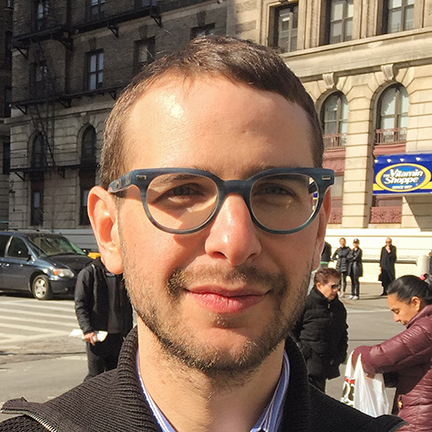Caught In Between Aesthetics: Spotlight on Composer Adam Roberts
by ALEX WEISER
“As a composer I’ve often felt a little bit like a black sheep, caught in between aesthetics. My music sits right in the middle of the Atlantic Ocean in some ways. I’m pulled to European avant-garde impulses, but I’ve never been willing to relinquish pitch and harmony.”

Adam Roberts is a composer of contemporary classical music who embraces influences as disparate as European Modernism, American Neo-Romanticism and Minimalism. Born to secular Jewish parents with family from Poland, Russia, and Germany, and raised in Columbus, Ohio, Roberts is currently splitting his time between Athens, Georgia (where he is Assistant Professor of Composition at the University of Georgia) and New York City.
Roberts grew up playing piano and was drawn to composition when a strain in his right hand slowed down his piano practicing. Early experiences at the Brevard Music Center and studying locally with composer Marshall Barnes were formative and provided an open and encouraging atmosphere to explore musical creativity. From an early age Roberts has been fascinated by the impulse to synthesize disparate musical influences. Roberts recalled, “When I heard performances of Charles Ives at the Brevard Music Center when I was a kid that was very inspiring to me. There was this sense of the music being connected to something old, but also the sense of wild breaking out of old patterns.”
Roberts continued his music studies at the Eastman School of Music (1999-2003), where he studied with David Liptak, Augusta Read Thomas, and visiting professors Steven Stuckey, and Martin Bresnick; and then at Harvard University (2003-2010,) where Roberts studied with Bernard Rands, Julian Anderson, and visiting faculty including Harrison Birtwistle, Chaya Czernowin, and Martin Bresnick (again). This mélange of teachers fit Roberts’ eclectic approach to thinking about music, and he responded with the urge “to pull together and integrate” these different perspectives in his music.
This interest in different approaches to music however, gives Roberts a feeling of not quite fitting into pre-existing stylistic categories. It is a feeling, Roberts wondered aloud, might be similar to the feeling of being Jewish. He explained, “There’s a sense of being a Jew I think, where, you basically look white, and white people, probably if they don’t know much about Jews, think you’re white, but you know that you’re a little different in some ways, so there’s this kind of weird sense of feeling of—and other—all at the same time.”
An intensive year of study in Vienna with Czernowin during Roberts’ years at Harvard provided a sharp challenge to Roberts to reflect on his relationship to a particularly noisy version of European modernism, and ultimately reinforced his eclectic interests. “I felt like I had to make a choice. I think I probably psychologically felt some kind of fear of not being in a group or sort of being alone in some way and eventually I embraced it, and I just started telling myself ‘well, maybe if you don’t fit into one of these groups so easily, maybe that’s a good thing,’ and even though it feels kind of scary that was something that I started to embrace.”
When discussing his style now Roberts says his challenge for himself is “how to embody and use a strong sense of visceral emotional music making, while also drawing on all of these amazing resources of color and texture and sound that we have at our disposal.”
We will be featuring music by Adam Roberts on our upcoming Young Jewish American Composers concert on November 2nd.
Based on an oral history interview with Adam Roberts conducted by Alex Weiser on September 4th, 2016 in New York City. Quotes have been adapted from the conversation in consultation with Mr. Roberts. The complete audio recording of the interview is now a part of the YIVO Institute for Jewish Research’s Sound Archive.
Alex Weiser is YIVO’s Programs Manager.




